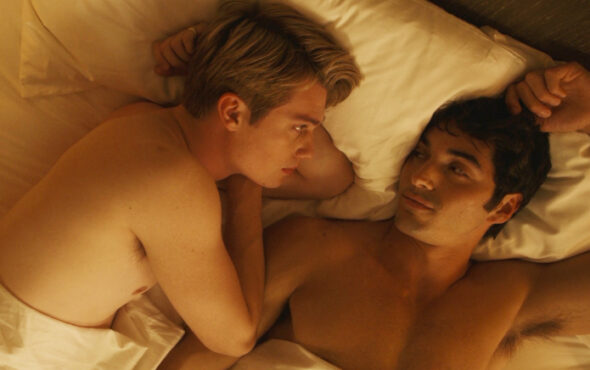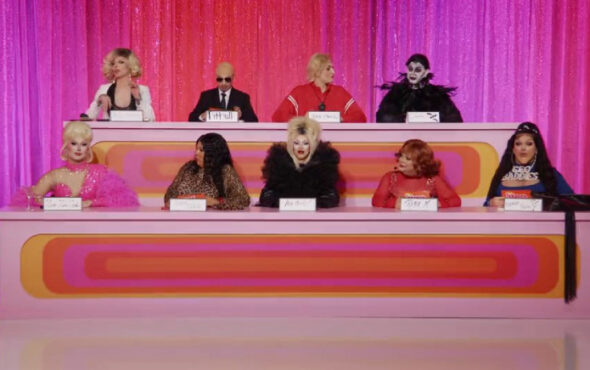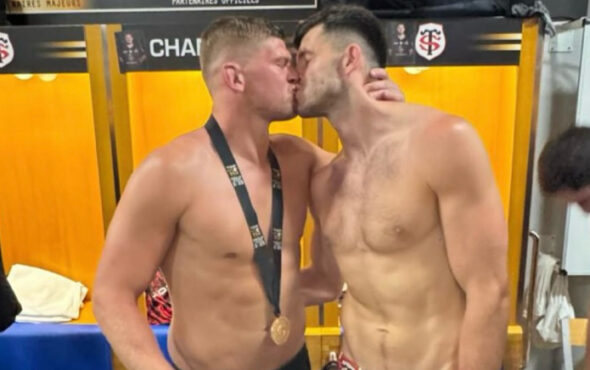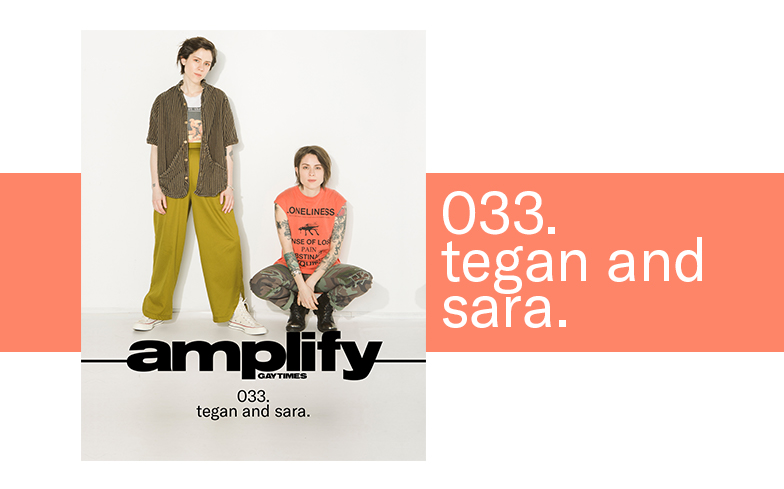
“We’re constantly celebrating men’s creative genius but we rarely do that for women.”
This year is significant for Tegan and Sara for three important reasons: it marks their 20th year in the industry – a remarkable feat for any act – and it sees the release of their long-awaited ninth studio album, Hey I’m Just Like You, and joint memoir. “We realised how significant our story was and how little we hear women’s stories, especially queer women’s stories, and creative women’s stories,” says Tegan. “We’re constantly celebrating men’s creative genius but we rarely do that for women.”
Titled High School, the memoir chronicles the Canadian pop duo’s journey towards self-acceptance and bout with drugs and alcohol during their adolescent years; a significant period in their lives because it’s “where we had our first deep love, where we learned how to be artists, where we took our first creative steps”.
As they time-travelled back to their youth, they discovered an entire album comprised of demos that were written in their high school years. Despite having “sophisticated traumas and triumphs” since then, Sara explains that her “words at 17-years-old” still resonate deeply with her due to the record’s themes of love, heartbreak and teenage angst.
“We were talking perfectly about what will happen when you become an adult when you go different ways from your first love,” Tegan continues. “It just felt emotionally deep and mature and now as a writer, I would overcomplicate an idea like that. I feel like this record is opening up a whole new world for Tegan and Sara, so we can write differently moving forward.”
Here, we speak to Tegan and Sara about their memoir, working with a team of all women on its companion album and how the music industry is still as rife with sexism and homophobia since their debut in 1997.
I wanted to start off with the video for Hey, I’ll Be Back Someday – why did you choose to take it back to the 90s?
Sara: We’ve been really careful to play with the era in which these songs were written and crafted, and to pay homage to that time period without making it feel too nostalgic. When we discovered the music, there was lots of discussion of, ‘Oh, shall we re-record them totally 90s alternative-style, like the sound we were listening to at that time?’ We really didn’t want this to be seen as a novelty or a joke. We wanted it to be taken seriously as our next album, as a project that we put a ton of thoughtfulness and skill and energy into, as 38-year-olds living in 2019. So for us, making what feels like a modern pop record, but using techniques and using the instrumentation that we would’ve 20 years ago felt like an appropriate thing. Same with the video, we just thought to make something that feels like it’s winking at that time frame, with the square format and having a few artifacts from that era, like the walkman. We were trying to give our own modern twist to it.
Why was now the right time for you both to re-record those songs?
Sara: We started working on our memoir about the 90s, our origin story, our time as teenagers and developing songwriters. The music that we discovered from that era just felt too good to ignore. We were writing about it, we were describing it, but we wanted people to hear it. The demos are rough, and everything is in the eye of the beholder. We hear the demos and go, ‘Oh my god, these sound fantastic.’ Now if I was to play you the demos, you maybe wouldn’t have the patience to listen to them [laughs]. But we just felt like we were diving so deep into that timeframe and it felt like an appropriate time to also say like, ‘Hey, we really do feel like this music is strong and we kind of forgot about it, but we’d love for people to hear it now,’ and sort of, I guess, reevaluate ourselves at 17 and 18, the early years. We don’t always feel like we got a fair shake in the media and it’s fun to now put that same music out now and have people revisit it.
Tegan: Every time we sit down to write a new record, the process, basically for a year, is we sit down every day and write songs and demo them at home and then we go to the studio to make a record. When I found these demos, we’d been writing for months, and I knew we were going to have another eight months or so of writing. The more I’d listen to the songs, the more I was like, ‘These are so great.’ We wrote them, we’re not cheating [laughs]. We’ve never put them on records, so why not? They were really rough and once we got through cringing and being embarrassed by some of them, we honestly couldn’t believe how good some of them were especially Sara’s stuff. If Sara sent me those songs now, I would be like, ‘These are the best songs Sara has written in a long time.’ They’re so vulnerable and raw, and the lyrics are so sweet and different from anything we’ve done recently. I just became obsessed and had a one-track mind about it.
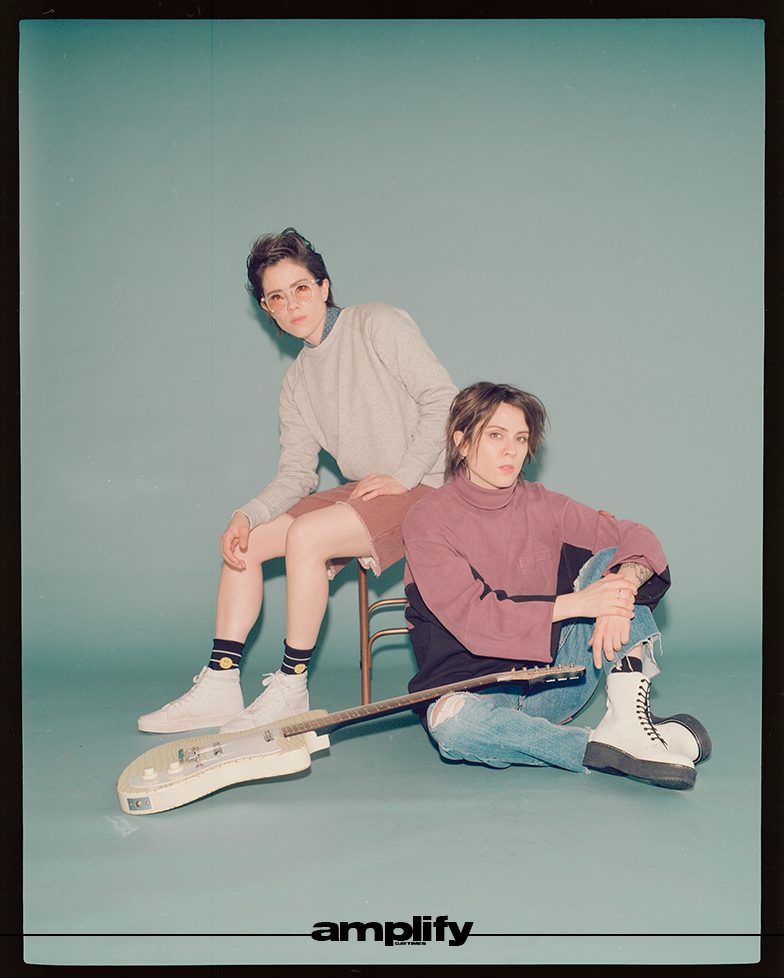
Did the songs still resonate with you 20 years later?
Tegan: Deeply. On the song I Know I’m Not the Only One when Sara sings, “You’ll lose me to places I’ve never been” I was like, ‘Oh my god, it’s so true, Sara, you’re so right.’ Or, “You’ll learn I’m not the only one who loves me like you do” like, ‘Fuck! My god.’ We were talking perfectly about what will happen when you become an adult when you go different ways from your first love. It just felt emotionally deep and mature and now as a writer, I would overcomplicate an idea like that. I feel like this record is opening up a whole new world for Tegan and Sara, so we can write differently moving forward.
Sara: The truth is, if we didn’t resonate with them now, we wouldn’t have had any interest in spending so much time re-recording them and putting them out, knowing of course that we would have to go out and tour them. The goal is always to write material and make art that will sustain you for years at a time, and these songs are no different. A lot is said about when we’re young, that our ideas and our feelings are developing or they’re, not throw away, but I think that we underestimate the power in some of those first seminal moments and our observations of them. I think that’s particularly true of women. Often, when we think about a 17-year-old girl writing about her first break-up, we think, ‘Oh, that’s silly, childish, not yet a fully-formed perspective.’ One of the things that was most shocking to me when we found the demos from high school was how much I resonated as a woman, who has now been in many significant relationships and has travelled the world and had a very successful career. I think of myself as being worldly and educated, and I’ve had sophisticated traumas and triumphs, and yet my words at 17-years-old resonate deeply with me.
If I didn’t know you both wrote these as teenagers, I wouldn’t have been suspicious in the slightest.
Tegan: Yeah, I think that was important to us. The reality is that the recordings from when we were in high school were horrible, in a lot of cases the lyrics were impossible to hear or make out or were weird, and we had to rewrite things. But in general, the themes and the melodies and the structures… we thought they felt current and modern. Maybe we’re visionaries, maybe we’re prophets! [Laughs] Maybe Tegan and Sarah went inside a time machine and delivered those songs. I’m not sure what happened but they’re fucking good! I was like, ‘These can be shared with the world.’
You’re both releasing your memoir alongside the album – why did you want to share this part of your journey with fans?
Sara: Not to be vague about it, but when the creative spark hits you… You know? We talked for many years about writing something, we didn’t quite know what it was. We had talked briefly about essays, our time in the music industry, we had talked about a collection of stories about our younger earlier life experiences. Tegan and I talked about how hungry we were for early adolescent coming out stories. Our fans are obviously asking us about our own experiences and want to share their experiences, so we were sort of circling around a lot of these big ideas. We were in a pitch meeting with our book agent, just spit-balling ideas, and we were talking about our adolescence, our time at high school. It was a time when we figured out that we were songwriters, it was when we got offered a record deal, when we started having relationships with girls, when our parents got divorced, when we did drugs, when we sobered up; there was a lot to cover, a lot of material in those three years. That seemed to be the idea that stuck.
Tegan: We’d been discussing how to spend our year off and we felt like we wanted to pursue a few creative pursuits that potentially weren’t music related, just to take a break. We’re always very hesitant to race into the studio and we generally wait for a spark of inspiration, so we started talking about all these ideas. One of them was to do a podcast, one was putting together a live record with stories. We thought, ‘Why don’t we write a book about our early career?’ Sara was interested in focusing on when we figured out we could play music and started to figure out we were gay, so to focus on high school. We d pitched it to our managers and everybody freaked out. The proposal sold in like two seconds and we were like, ‘Oh god, I guess we have to write a book now?’ As we started writing, we realised how significant our story was and how little we hear women’s stories, especially queer women’s stories, and creative women’s stories. We’re constantly celebrating men’s creative genius but we rarely do that for women. I think it became clear that this was an opportunity to tell a story that doesn’t often get told.
Was it hard recounting some of your adolescent years?
Sara: There was a lot of moments where we thought, ‘Oh my God, what have we taken on?’ We were not known as writers. We didn’t go to college or university or whatever, but I knew we were storytellers and I knew that we had enough grasp on the English language that we would be able to coherently tell a story. What we underestimated was how challenging it would be to make it an album. There’s a lot of flexibility when you’re making music, one song doesn’t need to connect to the next. You sort of want a sonic coherence overall but telling a story, like the one we were trying to tell, required a timeline, certain types of pacing and details between chapters. We had to learn that as we went. We had wonderful editors who were so encouraging and gave us a couple of really helpful hints early on. We’re Virgos so we were really organised and made lots of charts, timelines, and paperwork before we started making the book. That part was challenging. In terms of the emotional landscape… it has been wild. To be that deeply embedded in a time, you know, reading journals, watching VHS tapes, writing eight hours a day five days a week… There were stretches of weeks where I was back there and would dream about myself as a young person. Yeah, there was definitely stuff uncovered.
Tegan: It was definitely difficult. It’s very different from music in many ways. Even though we each write individually, we stand together, and the book is different in that sense because it’s the first time ever that our voices are heard separately. Our voice on the page is our own and that is super scary as I was writing because I couldn’t hide behind lyrics and the limitations of how many lines and all that stuff, so it was hard. In terms of how personal it was, the majority of people that we wrote about in the book we’re still in contact with, specifically Naomi, Sara’s main love interest and Alice, my main love interest, and Spencer, my boyfriend throughout high school. They’re still our closest friends to this day. We wrote to everybody and explained why we wanted to do the book and how important the story was to tell and got everybody’s blessing. We were sharing our story, not their story, so the difficulties were in trying to protect them. There were moments where I really laboured over certain aspects, like the drug thing for example. I really felt like it would be lame to downplay our drug use because anybody who knew us in high school knew that that was such a huge part of what we were going through. If we were going to write this book, then we needed to be honest. I also feel like we constantly celebrate men for their story about psychedelics and their identity, and no one ever talks about women and drugs. We don’t let women explore that part of themselves, so me and Sara became increasingly interested in showcasing that part of our lives. Women take risks, women are deep, women are three-dimensional… it’s not just the men who are born that way. Women have a lot to offer.
Sara: The most profound part for me is that it’s so easy to write off a period of time because most people do not wanna go back and look at high school. Yet television and film and music is filled with stories about our adolescence. As a society, we’re obsessed with it. Some of the most important shows on television right now centre on high school – look at Sex Education, look at Euphoria, look at Big Mouth. We say, ‘Eww, high school!’ and make it seem like it’s not this valuable, treasure trove of experience yet for me and Tegan, they were seminal life experiences. This is where we had our first deep love, this is where we learned how to be artists, where we took our first creative steps.
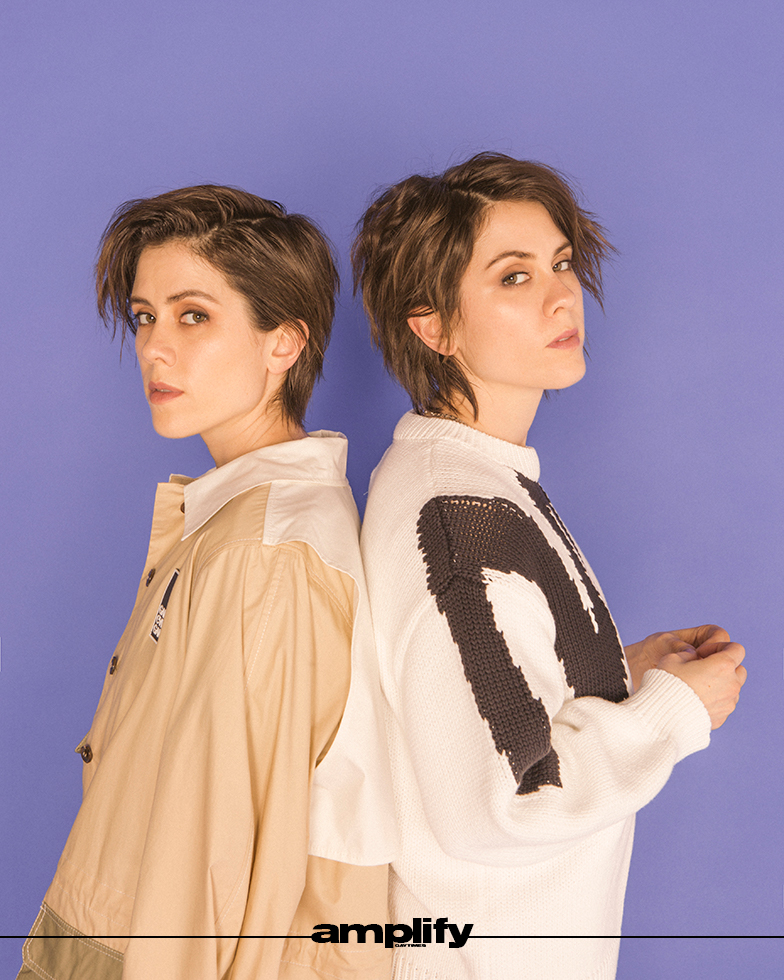
This album is significant because it’s your first to be produced, mixed, mastered all by women – how different was this recording experience for you both in comparison to your previous albums?
Sara: This is our ninth album, and every album we’ve made, I always joke that a majority of the people in the room were women. Usually, the studio is Tegan, me and a producer [laughs]. Even though we have often worked with male producers, Tegan and I co-produce our records and we’ve always written our songs, in some ways I didn’t necessarily think about our records as being not made with the support with women; because we often were the majority in the room.
Tegan: Every experience in the studio is so different and this was the same. There was definitely a different vibe consistently having four other women beside us and it wasn’t just working with women for the first time, we were working with queer women which was really cool. I felt like there was a lot of bonding, which is not necessarily what happened in the past. But like I said, every time we go into the studio it’s a really unique experience, like working with Greg Kurstin. He’s a wizard and he pushed us into places we’ve never been, and he really built up our confidence. He was working with the biggest stars in the world, in the middle of it he flew off to London to work with Adele on Hello! I think this time working with Alex and Rachel and all the women, what stood out to me was the camaraderie and the group effort. I felt really open to ideas and being challenged, and I think women challenge each other in different ways. We’ve been in the studio with so many talented men over the years but it was incredible to watch Alex hold her own; she played every instrument and she didn’t second guess herself, she was really incredible.
Sara: We started talking about this in conjunction with The Tegan and Sara Foundation and some of the inequities that LGBTQ women and girls face in the world, specifically in the music industry. Whether you identify as queer or not, it’s depressing and sometimes frustrating to see that statistics around technical positions in the music industry, jobs like engineering and mixing and mastering and producing, that these jobs are often predominantly filled by men. I’m not talking about a small 60-40, in some cases it’s abysmal, women were represented in the single digits. As we started talking about that, we were like, ‘Well, we can do more to make sure that we can speak on this topic eloquently.’ When we look at statistics sometimes, it can be easy to get lost in those numbers. We were like, ‘Okay, people say it’s hard to find a female producer – what if we tried to find a female producer? We’ve never worked with a female producer before.’ We’ve co-produced records ourselves, so it was important for us to actually live that experience of going out and finding a badass team of people and make sure that they’re all women, they’re all excellent. The truth is that it was amazing; we’ve made albums and had an amazing experience in the past, but this was so unique. Producer Alex Hope, she has tons of experience and has made tons of wonderful music, but she had never made a full album before. She’d always worked on singles or a couple of songs here and there, so it was really fun to be with someone who was having their first album-making experience. That was awesome. To work with people who would not necessarily be given an opportunity to be a big voice in an important room was exciting to share that experience, especially people who would be potentially overlooked because of their age or because of their sex.
Do you think the industry has changed that much in the past 20 years in regards to sexism and homophobia?
Sara: How do I put this distinctly? We certainly are not naive about the industry and I do not know if it has changed that much, to be honest with you. Tegan and I are unique in that we came into the music industry with a punk attitude and we really protected ourselves and advocated for ourselves, due in part to our upbringing. Our mother was very outspoken and she was a feminist and an activist… Tegan and I did not come into the industry without tools, we had strategies and tools to counteract some of what we were experiencing. We weren’t surprised to experience those things, there was a ton of homophobia and sexism and truthfully, if I look back at the early part of our career, it wasn’t necessarily executives or music industry people, we didn’t really talk to those people because we were small fish in a big giant ocean. It was actually the press, the journalists, the radio station people, the club promoters; we were dealing on a daily basis with people who felt very comfortable asking inappropriate questions, talking about us in inappropriate ways, asking us for inappropriate things. Those experiences were harrowing and traumatising and infuriating. What we learned from those experiences is that it was indicative of what was happening on a higher institutional level. If the people in radio stations and magazines were allowed to treat us this way, then we imagined that the people above them that we weren’t in contact with were likely going to be just as difficult. Those were very difficult times and there was a lot of conversation about, ‘What do we do here? We’re trying to build our career to survive, how do we take this on from a political standpoint? How do we deal with this?’ That’s been one of the big challenges of our 20-year career is knowing when we had power to speak up and how to speak up to make change and create a community of artists who wanted to share these things. In the early days, nothing cleared the room like, ‘Hey guys, the music journalists sure are homophobic and sexist, huh?’ Nobody wants to talk about that. Nobody.
Tegan: Yeah the industry feels pretty much the same. I think the conversation maybe feels slightly more grown-up and more nuanced, with the language at a radio station or when you talk to executives at a label… People are definitely more sensitive and we’re less of an anomaly now, and being less than of an anomaly is definitely good. If anything, I’m seeing this terrifying swing that I’m really worried about and I hope I’m proven wrong and I’m happy to be wrong, where there’s this push for mainstream outlets to have their gay side of things and we’re just going to be segregated into the gay side. We’re still not in your magazine, we’re in the gay version of your magazine, it’s like we’ve gone too far. We’re trying to embrace gay culture so much that we embrace it right into a different part of the room, that part of the building, and that scares me. I definitely see more a trend of queer artists hitting the mainstream, the industry is now committed to turning into a poster board for queer culture at all times, I’m not sure how that helps anyone. I also think there will inevitably have to be a backlash from queer artists, where they’re going to start pushing back and saying, ‘I don’t want to be identified as a queer artist, because it limits me.’ This is something Sara and I have gone through several times in our career.
Sara: It’s a complicated answer because I don’t think it’s completely changed. Tegan and I are now more successful so people are terrified of us [laughs]. When we were 22-years-old, people weren’t scared of us and we needed them more than they needed us. Now, people are like, ‘Oh, we really want to interview Tegan & Sara, gotta get the old algorithm cooking. Let’s get their fans clicking on the ol’ headline’ or whatever.’
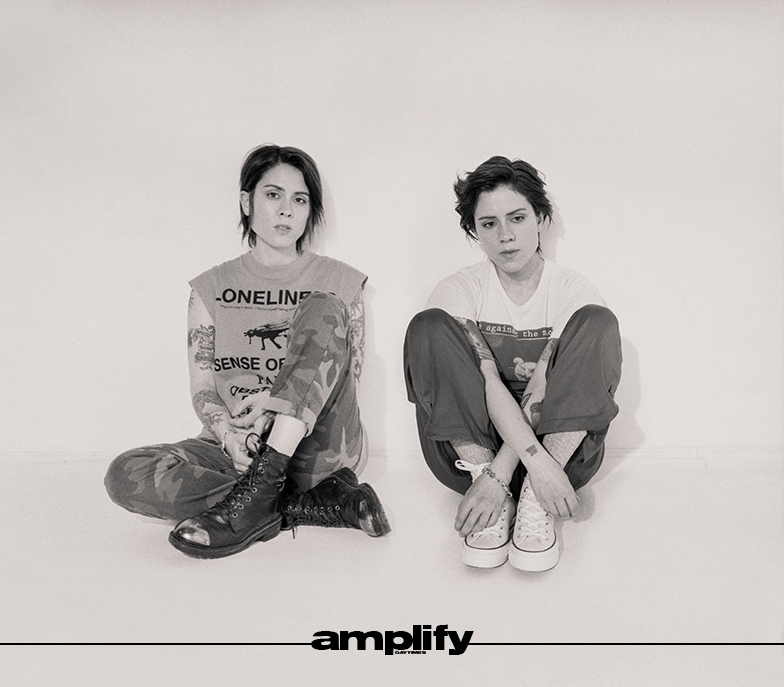
Although the industry hasn’t changed in regards to men largely being in control behind the scenes, we have recently seen a massive increase in LGBTQ artists breaking through the mainstream, especially queer women. Why do you think it’s all happening now?
Tegan: I think queer culture has been mainstreamed in a way that I haven’t seen in my life, until now. I think gay men have flourished in certain pockets for a long time but I think this young wave of women coming up, similar to Sara and I, they’re universally accepted and they’re liked by the mainstream. It’s a combination of factors; mainstream has changed; music has changed; streaming has opened up a whole new world. You can be popular and never have been on the radio. I think in general, queer people were kept and marketed only to queer people up until a certain point, and I think that is changing. We were marketed to gay people, but really just gay women, not gay men. When we hit the mainstream, all of a sudden, everybody liked us. I assume that’s what is happening to a lot of these artists, all of a sudden it’s okay for you to like any genre of music and any kind of person, even if it’s not the same kind of person you are. I think that’s just allowed our scene and everything to become bigger and more successful. I also think a lot of these people were thriving and doing well, well before people were taking notice. The media is just noticing all of a sudden.
You’ve spoken up about LGBTQ issues constantly throughout your career, with The Tegan and Sara Foundation for example. Do you think other artists have a responsibility to educate their followers and speak out on LGBTQ issues?
Tegan: I definitely think that people with power or platforms like ours should use it for influence. We should all be doing more to shine a light on things that matter to us, whether it’s paediatric cancer, climate change or Black Lives Matter. It can be anything. When you get to the position we’re in, of course, you should be giving back. There are easy ways to do it, but just because you are in that position, doesn’t mean that you’re great talking about it publicly, and that’s okay too. A lot of people are interested in helping out but don’t want to use their platforms to speak on topics they’re not particularly articulately comfortable talking on. We have to find a balance.
Sara: I think everyone has a different path and a different level of comfort. It’s certainly heartening to see people talking about their identities. It’s not about the individual, it’s about the community, and I’m still very heartened by the idea that the community itself needs leaders, mentors and it needs different perspectives, age groups, backgrounds. So often, you see the same people representing an extremely complicated, complex, diverse group of people. I’m not trying to pick on any of us who are outspoken, but for a long time, it was just white, rich, cis people who represented the queer community, specifically white, rich, cis men. We can complain about that and we can feel annoyed by that until somebody else stands up and says, ‘Okay fine. I want to be represented too. I wanna talk about my experience. I want to talk about what’s on my mind.’ It shouldn’t all be celebrities. To be honest, I’ve always wanted to get to a place where it just makes no difference, you’re gay, you’re straight, nobody cares. That doesn’t just happen overnight. You have to do the work to dismantle the social misunderstandings, discriminations, whatever it is. I’m just heartened when I see anyone speaking out about their identity, acknowledging that there is this diverse community and all voices need to be represented.
Tegan: A great example is Taylor Swift, she was someone who avoided politics and then saw a time in her career where she could really make a change, and she’s doing that now. She’s not shying away from having those conversations and it’s really inspiring. Dan Reynolds is another one that’s stepping up. With The Tegan and Sara Foundation – which raises money for LGBTQ women and girls – some people said, ‘What about men? What about climate change?’ Our firm belief is that if this resonates with you, then great. If it doesn’t, find something and get behind it. We should all be invested in what’s happening in the world right now… just care about something! It doesn’t have to be what I care about. Just get invested. I just hope we inspire people to care. We’re living in a very social media, online, ‘let me show you what I had for brunch today’ phase in society. Let’s care about brunch and climate change.
High School will be available in stores from 25 September. Hey I’m Just Like You will be released on iTunes and streaming services 27 September.

